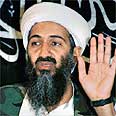
Not welcome: Osama Bin Laden
צילום איי פי
Britain to deport, ban Islamic radicals
Muslim, human rights groups slam measure, say law is 'vague', could negatively affect other global struggles; Blair: 'rules of the game are changing'
Britain has finalised proposals to deport or bar foreign Islamic radicals in the wake of the London bombings, and declared that it would put them into force in a matter of days.
Home Secretary (interior minister) Charles Clarke said the newly drafted list of "unacceptable behaviours" would counter the "real and significant" threat of terrorism.
But Muslim groups and human rights advocates said the measures were too vague, and feared they might affect legitimate global struggles against human rights abuses.
They are also worried about the deportation of hardline Islamists to countries where they may face torture or even execution.
Law to take effect soon
Clarke said the plan would take effect "very quickly ... (in) the next few days," and that the authorities were already considering a number of people engaged in unacceptable activities.
"All our foreign posts throughout the world are looking at their particular country... and, of course, we have got the names that are widely in the public domain at the moment," Clarke said.
He said he had an obligation "to stop people coming into this country to get young people, in particular, to behave in the appalling way we saw in July."
Changing game
The list is part of a wide-ranging government crackdown on Islamic extremist and other groups in the wake of the July 7 suicide bombings, which killed 56 people, and attempted copycat attacks on July 21.
Prime Minister Tony Blair warned earlier this month "the rules of the game are changing."
The Home Office plan -- compiled after a two-week consultation with Muslim groups and other organisations -- applies both to non-British citizens already in the country and those who want to come here.
The so-called "unacceptable behaviours" include those which:
- foment, justify or glorify terrorist violence
- seek to provoke others to terrorist acts
- foment other serious criminal activity or seek to provoke others to commit serious criminal acts, or
- foster hatred which might lead to inter-community violence in Britain.
The list was shorter than a draft proposed by Clarke three weeks ago, but the Home Office said the final version was "indicative rather than exhaustive".
Comprehensive ban
The banned views could be aired by writing, producing or distributing material, public speaking or over the Internet. They could also be delivered by someone in a position of responsibility such as a teacher or community leader.
Those given a deportation order in Britain have the right to appeal, while anyone banned from entering the country can seek a judicial review.
Dismissing fears of an infringement on free speech, Clarke said: "These powers are not intended to stifle free speech or legitimate debate about religions or other issues."
Muslims fear witch-hunt
Inayat Bunglawala, a spokesman for the Muslim Council of Britain, disagreed, arguing the criteria were too vague.
"We are especially concerned that senior Islamic scholars will be barred from the UK purely on the basis of media witch-hunts orchestrated by pro-Israeli elements," Bunglawala said.
Human rights group Amnesty International branded the measures "a serious attack on human rights". It said they "violate basic human rights and the UK's international obligations".
The United Nations' special rapporteur on torture, Manfred Nowak, said Britain's plan to deport firebrand Islamists to countries with poor human rights records would expose them to "a real risk" of the death penalty.










